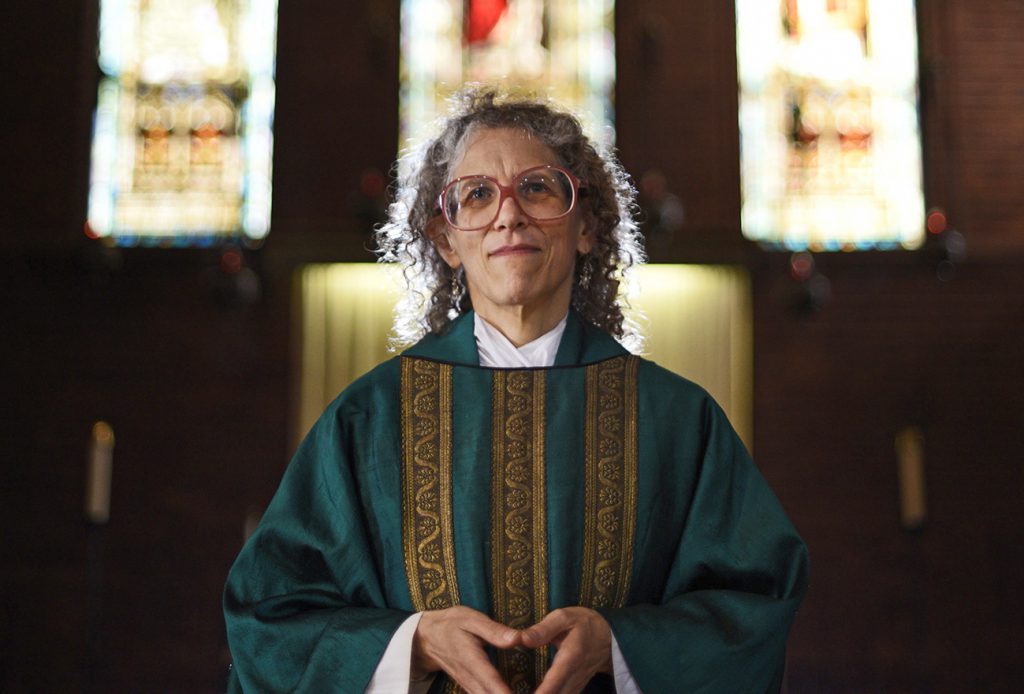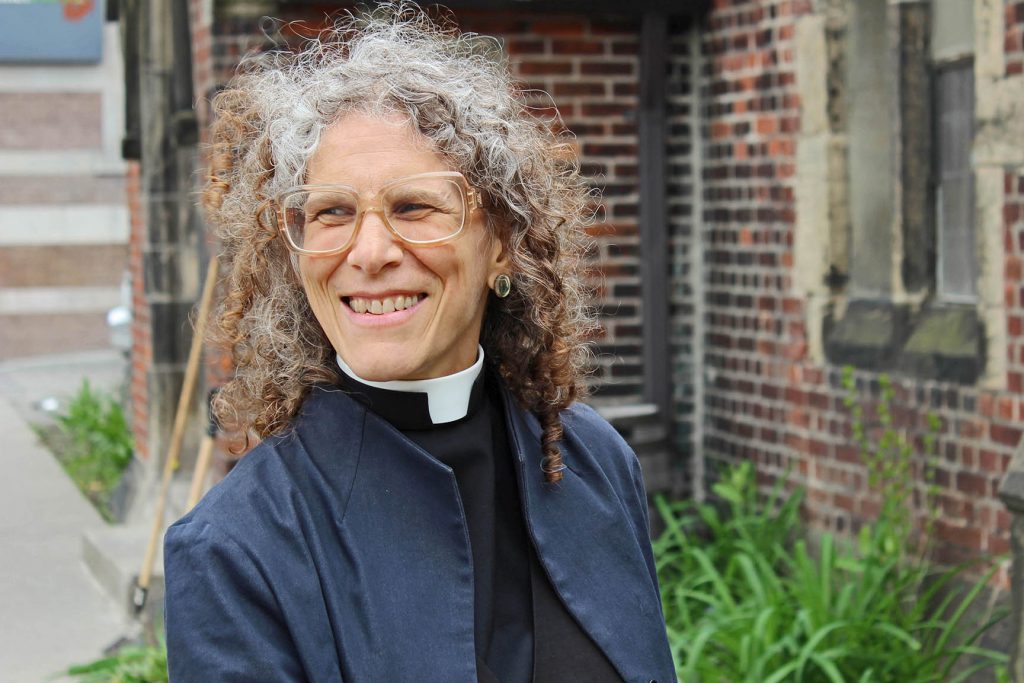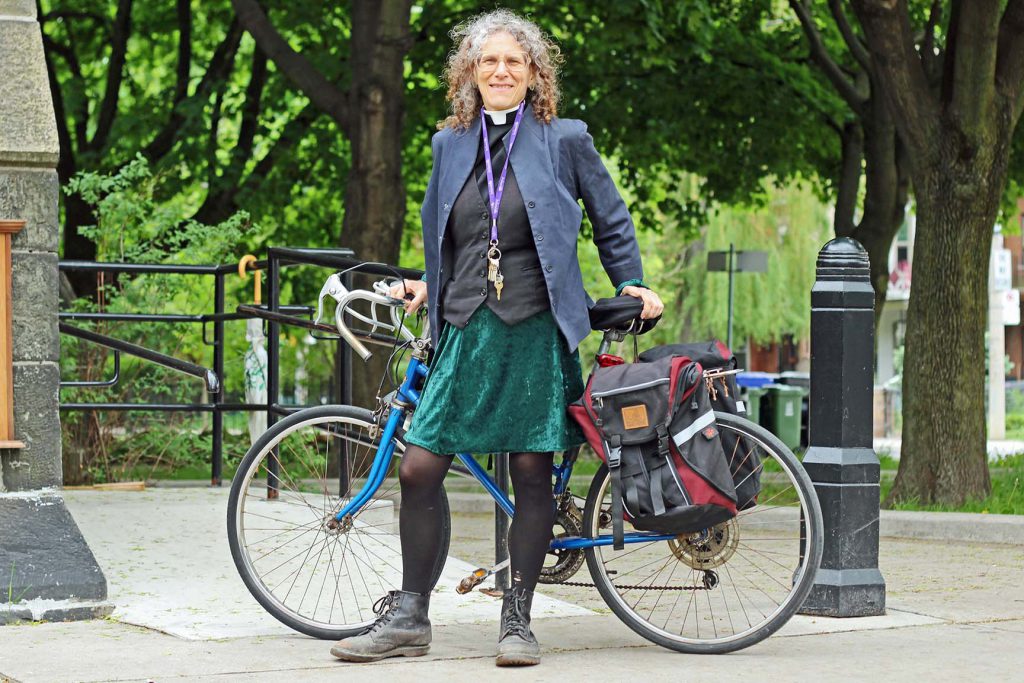Maggie Helwig ’11 is a writer, an activist, an advocate and an Anglican priest—Jennifer Matthews spends a few hours learning how she makes all these roles work in harmony
By Jennifer Matthews

The Rev. Maggie Helwig could use a coffee.
It’s a sweltering September afternoon, and undoubtedly a break anywhere with air conditioning would provide a welcome respite.
But things don’t always go as planned.
When we meet inside the Church of Saint Stephen in-the-Fields, in the heart of Toronto’s Kensington Market, she greets me from behind a tiny desk just inside the front door and suggests that we head out to a nearby coffee shop after a quick tour of the church.
We never do leave for the coffee shop. Instead, our conversation over the next few hours is punctuated by a steady stream of people, all wanting Helwig’s attention in some form or another. There’s the barefoot stranger playing piano and singing in the back room (“I’ve never met him before,” says Helwig); to a distressed man she does know who wants her to make a phone call on his behalf (he reappears four times); to the person playing the off-limits grand piano in the main chapel, whom Helwig compliments on his talent and gently redirects (and then provides with a small bag of hard-boiled eggs, bread and fruit when he asks for a bite of food); to the man who wanders in, inquires about the building’s architecture and responds with incredulity upon learning that Helwig is the parish priest.
It’s a typical day at Saint Stephen’s, explains Helwig, who seems unfazed by the interruptions. And that suits her just fine. “This is a mad little parish,” she says. “And it’s the only place where I feel I can actually be myself.”
Developing a sense of self.
A self-described introvert, Helwig had a strong sense of identity even at a young age. She was just three years old when she knew she wanted to be a writer. At age 12 she started a Greenpeace chapter in Kingston, Ontario, where she and her family lived. Her first arrest was in 1977, as she and other activists protested the development of the Darlington Nuclear Reactor. “I promised my parents I wouldn’t get arrested before I turned 16,” she says. (She kept her word by a few months.)
Helwig credits her parents with instilling in her a strong sense of social responsibility. Her father, author David Helwig, was also a professor at Queen’s University during her childhood. He and Helwig’s mother, Nancy, volunteered with inmates at penitentiaries in Kingston—David taught creative writing and Nancy led theatre classes. Helwig speaks with pride about some of the students her parents worked with, some of whom became lifelong friends of the family.
While Helwig’s family did not attend regular church services and her parents don’t identify as Christian, her father sang in an Anglican choir and when she was 10, gave her a copy of the King James Bible to read, for its literary value. A voracious reader, Helwig “thought about spirituality for years,” exploring poets like T.S. Eliot (she was particularly moved by “The notion of some infinitely gentle Infinitely suffering thing” expressed in Eliot’s Preludes) and John Donne. It was Donne, she says, who ultimately made her a Christian—perhaps because he provided an example of how one could combine the arts of writing and ministry, a journey she would later make for herself.
Finding the church
At age 19 Helwig felt it was time to be baptized. She recalls being drawn to the altar, able to visualize herself there but at the same time aware that “I wouldn’t have been good at it at the time.” Following her baptism, she spent several years attending various churches throughout the Greater Toronto Area, inspired by one in Regent Park for its role as a centre of community, and drawn to Saint Thomas’s Anglican Church for the liturgy, music, and the work it was doing in the surrounding community. It was at Saint Thomas’s that she met Andrea Budgey. Both active volunteers with the parish’s outreach programs, neither woman was aware at the time of the influence they would ultimately have on each other’s lives.
During these years Helwig settled with her husband and daughter near Toronto’s bohemian Kensington Market neighbourhood. She published numerous books of poetry, essays and short stories, edited dozens of anthologies, and organized arts and literary festivals. In 2001, she published her first novel, Where She Was Standing, which was followed by 2004’s Between Mountains and 2008’s Girls Fall Down. The latter was shortlisted for the Toronto Book Award and the Re-Lit Award, and chosen as the 2012 One Book Toronto title.
Her activism continued as well, with the East Timor Alert Network in Toronto, the Women in Black network, and War Resisters’ International. Despite her full and active life, Helwig felt a growing sense of frustration as the pull of the priesthood became stronger, but the path wasn’t clear. “I felt there wasn’t a place for me at the church,” she recalls. “Andrea jumped before I did, and in doing so, showed me there was a possibility.”
Andrea Budgey, who had become a close friend, enrolled in Trinity’s Divinity program and obtained her Master of Divinity (MDiv) degree in 2006. Budgey was ordained priest in 2008 and became Humphrys Chaplain of Trinity College later that year.
In 2005, Helwig was hired by the Anglican Diocese of Toronto as Parish Outreach Facilitator, to encourage greater involvement by parishes in social justice activities, and movement from a charity model toward more advocacy and solidarity. In 2007, she enrolled in the Divinity program at Trinity College, at first part-time. She was co-head of Divinity in her final year at the College, and a member of the Trinity College Volunteer Society, which she describes as “a good place to connect with people who are smart, committed, and looking for something good to do.” She also continued her long-standing involvement with the Out of the Cold/Out of the Heat meal program at Saint Thomas’s Church.
In 2011, Helwig earned her MDiv from Trinity College. The following year, she turned 50—and became an ordained priest in the Anglican Church.
Coming home to St. Stephen’s
The Church of Saint-Stephen in-the-Fields, known to most as simply St. Stephen’s, is a small, Anglican, downtown Toronto parish with a deep connection to the diverse community that surrounds it. The Victorian Gothic Revival building itself is a heritage site, constructed in 1858 by Robert Brittain Denison on his property. The church’s name denotes its original pastoral setting—some believe the modest structure may have been built as a house of worship for the estate’s workers.
In 2013, Helwig became priest-in-charge of St. Stephen’s, and was appointed as rector in 2015. It seems that her passions for speaking up for others, for expressing her art through words, and for preaching have all combined to make her the ideal priest to lead this unique congregation.
St. Stephen’s is a true centre of community. It houses a community garden, seed library, and the Canadian headquarters of Christian Peacemaker Teams, an international organization set up to support teams of peace makers in conflict areas around the world (Helwig herself is trained in and leads workshops to teach non-violent conflict resolution strategies). St. Stephen’s engages in ongoing advocacy related to environmental protection, Indigenous rights and income equality. The parish has been home to a weekend breakfast program for more than 30 years, and on Friday nights offers a Safe Spaces drop-in. “When you’re homeless, you don’t often experience quiet and solitude,” says Helwig. “Our Friday nights offer food, comfort and support, at least for a few hours.”
After spending a few hours in the church, though, it is clear that St. Stephen’s generally and “Mother Maggie” in particular are sources of comfort and support to many people every single day. “This is the church of everyone,” she says. “I recently overheard a parishioner telling someone that lots of churches say that all are welcome, but St. Stephen’s actually means it.”
Being able to foster that sense of belonging is one of the aspects that Helwig loves most about her role. It’s also one of the most challenging for her. “We are in an area of extreme poverty and suffering,” she says. “Absorbing that day after day can be painful because there is often very little I can do to change things.”
Helwig says she restores herself by riding her bike through the city’s ravines, reading murder mysteries, and “going to Evensong at Trinity as often as I can.”
Serving breakfast for all
Early every Sunday morning, Helwig can be found in the St. Stephen’s kitchen, helping to prepare breakfast for anywhere from 130 to 150 people. From 6:30 until 8 a.m., all are welcome for a meal of oatmeal, rice and vegetables, hard-boiled eggs, fruit and coffee, usually prepared and served by a team of six or seven people. “We’ve gotten it down to a science,” says Helwig of the program, adding that while they sometimes receive food donations, most of the breakfast program is financed through the church’s small budget. A similar program runs at the church every Saturday morning as well.
Megan McGinnis-Dunphy ’12 has been volunteering with the St. Stephen’s breakfast program for a number of years. President of the Trinity College Volunteer Society during her undergrad years, she first met Helwig when both women were volunteering with the Out of the Cold/Out of the Heat program. She later joined her at St. Stephen’s, where she helps with the breakfast program.
“Maggie is absolutely committed to helping marginalized people, and she treats everyone as an individual,” says McGinnis-Dunphy. “I trust her. And I would follow her anywhere.”
Connecting faith, art and activism
“One of the fantastic things about Maggie being at St. Stephen’s is that the parish was focused on outreach before her time and has now expanded to include an even wider range of people and perspectives,” says Budgey, who is also St. Stephen’s honorary assistant. “Her remarkable career as a peace activist and writer has further enriched her role in the parish.”
Indeed, it appears as though this woman who has long understood that she is a writer, an activist and a preacher has found the path and the place where those gifts can be put to their best uses. For some, the connections between faith, art and activism may not be as readily apparent, but Helwig and Budgey are aiming to change that.
The Faith, Art and Activism Festival, started by the pair in 2013, is a month-long series of events hosted at both Trinity College and St. Stephen’s each fall. “The Trinity Chaplaincy and St. Stephen’s have a natural connection,” says Budgey.
The festival’s events range from panel discussions to concerts to special services and even Nuit Blanche installations. One year, for the overnight, city-wide modern art celebration, St. Stephen’s hosted a performance art installation called “The Composition Engine.” Readers, singers and musicians were situated in the sanctuary, each next to a lamp. Audience members (more than 500 came through that night) activated or silenced the musicians or readers by turning their lamps on or off. The effect was powerful, and for many observers, unexpected.
Said Helwig, who read from Dennis Lee’s Testament and Tim Lilburn’s Tourist to Ecstasy, ”The church has been, and can still be, a space for artistic exploration which has real aesthetic credibility and isn’t just a devotional product; it means taking the risk of moving out of comfort zones on both sides, but that’s what both art and faith should be about, anyway.”
Budgey agrees. “We are always negotiating connections between faith and art, faith and activism, activism and art. I’m a musician, so practicing my art in the context of liturgy is dead easy. Maggie is a word artist, and she practices that every week. Sermons are an often-underappreciated form of art—but when people hear Maggie preach, they are blown away.”
Budgey also points out Helwig’s participation on the board of directors of the Friends of Kensington Market, her role as chair of the Social Justice Committee of the Diocese of Toronto, and her ongoing representation of the church at events from the Pride Parade to social justice awareness walks. Oh, and there’s also the weekly e-newsletter that Helwig writes and distributes to friends and parishioners of St. Stephen’s.
“I am personally amazed at how she keeps all of these balls in the air,” says Budgey.
For her part, Helwig says it is the liturgy that is the most powerful aspect of her multi-faceted role. “To celebrate Mass is tremendously important to me. I feel I am doing what I am meant to do,” she says. “This church and its ministry bring beauty, music and poetry to those who are often excluded from those experiences. Everyone needs beauty.
“When I look out from the pulpit there is often a lot of movement in the room. And that’s OK—that mixture of high ritual, the sacramental aspect of the Mass, and people doing what they need to do really appeals to me.”
Preaching acceptance and healing
In a recent sermon, Helwig spoke about the need for the church—for all of us—to hear the often-painful stories of those who have been hurt by racism, misogyny, homophobia, and transphobia. She stressed the importance of creating an inclusive environment in which people can feel safe sharing those stories. It is, certainly, the kind of environment I witnessed during my few hours at St. Stephen’s, and the kind of role Helwig plays as Mother Maggie. Said Helwig:
“Ephphatha, says the voice of God. Be opened. Raise voices, open doors, let the bread be given freely, the bread which none of us deserve and all are offered, for there is enough, there is always enough, it is only our own false distinctions which would tell us otherwise. Let the silenced voices speak, and speak for long enough that their truth can slowly emerge. We cannot heal everything—most days, we cannot heal much at all. But we can open the house, and that is at least a place to start.”



Sorry, comments are closed for this post.